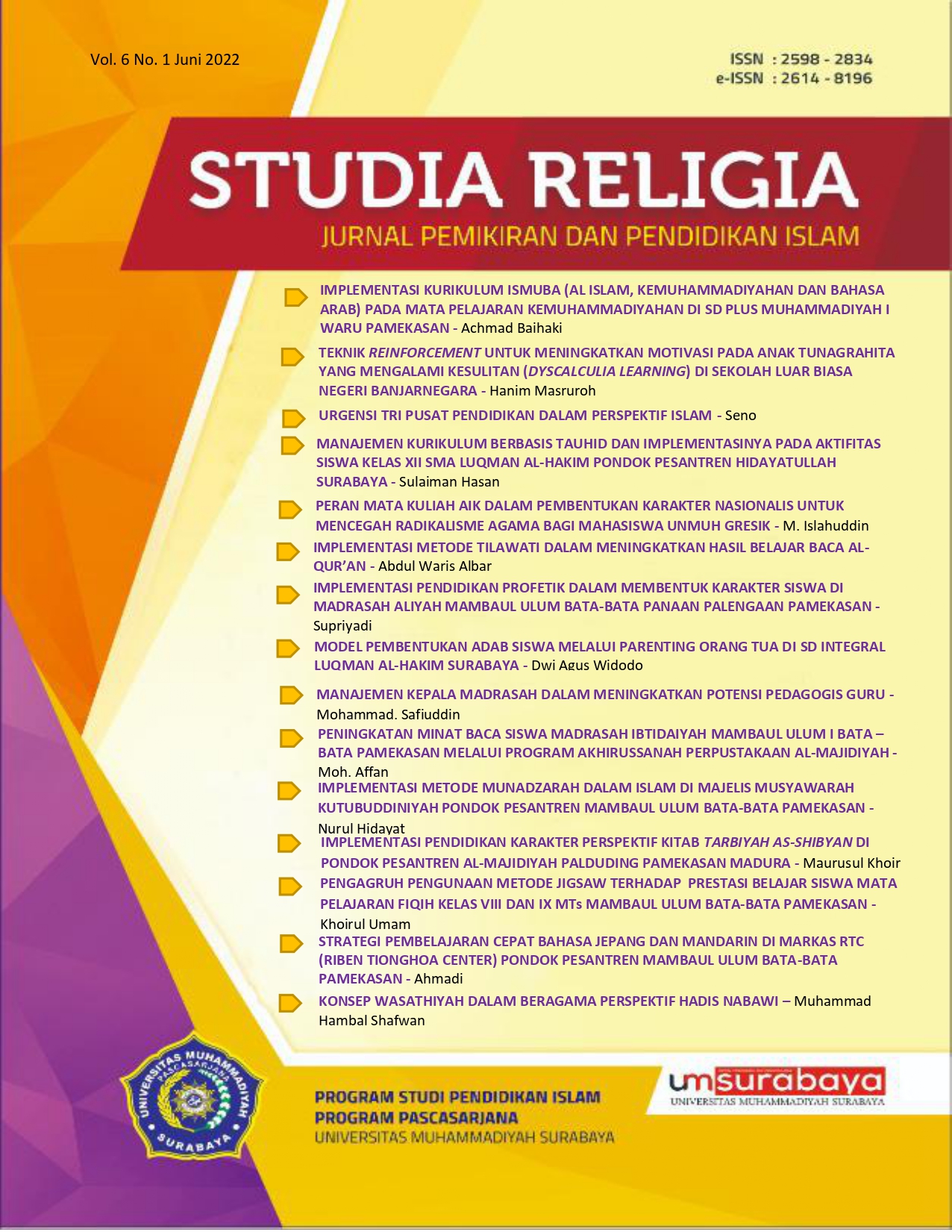IMPLEMENTASI KURIKULUM ISMUBA (AL ISLAM, KEMUHAMMADIYAHAN DAN BAHASA ARAB) PADA MATA PELAJARAN KEMUHAMMADIYAHAN DI SD PLUS MUHAMMADIYAH I WARU PAMEKASAN)
DOI:
https://doi.org/10.30651/sr.v6i1.13172Abstrak
Â
This research was conducted because the background of the existence of SD Plus Muhammadiyah 1 Waru as the only Muhammadiyah charity in the field of education in the northern region of Pamekasan which is in great demand, but the number of Muhammadiyah cadres is still minimal. The formulation of the problem from this research is first, how is the implementation of Muhammadiyah learning in SD Plus Muhammadiyah I Waru Pamekasan. Second, how is the implementation of the Islamic education curriculum of PP Muhammadiyah at SD Plus Muhammadiyah 1 Waru Pamekasan. Third, what are the inhibiting factors for implementing the Ismuba curriculum in Muhammadiyah learning. This type of research is field research in the form of case studies, collecting primary data through interviews from school principals, waka curriculum, teachers of Islamic subjects. The secondary data was obtained from the literature and documents of SD Plus Muhammadiyah 1 Waru, after all the data was collected a qualitative analysis and described in a descriptive form. The results of this study conclude that first, the implementation of Muhammadiyah learning applies an expository learning strategy with a time allocation of 1 x 2 hours and the assessment is authentic. Second, the implementation of the ismuba curriculum of PP Muhammadiyah Education using integral-holistic. Third, the inhibiting factors are the occurrence of noise, lack of time allocation, the Muhammadiyah has not been controlled by school stakeholders and the Muhammadiyah program has not been realized in the family environment.
Â
Penelitian ini dilakukan karena dilatar belakangi adanya SD Plus Muhammadiyah 1 waru sebagai satu-satunya amal usaha muhammadiyah bidang pendidikan di wilayah utara Pamekasan yang banyak diminati, akan tetapi jumlah kader Muhammadiyah masih minim. Rumusan masalah dari penelitian ini adalah pertama Bagaimana implementasi pembelajaran kemuhammadiyahan di SD Plus Muhammadiyah I Waru Pamekasan. Kedua, Bagaimana implementasi kurikulukm ismuba Dikdasmen PP Muhammadiyah di SD Plus Muhammadiyah 1 Waru Pamekasan. Ketiga, Apa yang menjadi faktor penghambat implementasi Kurikulum ismuba pada pembelajaran kemuhammadiyahan.Jenis penelitian ini adalah penelitian lapangan yang berbentuk studi kasus, menghimpun data primer melaului wawancara dari kepala sekolah, waka kurikulum, Guru mata pelajaran kemuhammadiyahan. Adapun data Sekunder di dapat dari literatur dan dokumen SD Plus Muhammadiyah 1 Waru, setelah semua data terkumpul analisis secara kulitatif dan diuraikan dalam bentuk diskriptif.
Hasil dari penilitian ini menyimpukan bahwa pertama, Implementasi pembelajaran Kemuhamadiyahan menerapkan strategi pembelajaran ekspoitori dengan alokasi waktu 1x2 jam dan penilaiannya autentik. Kedua, Implementasi kurikulukm ismuba Dikdasmen PP Muhammadiyah menggunakan integral-holistik. Ketiga, Faktor penghambat yatu terjadinya kegaduhan, kurangnya alokasi waktu, kemuhammadiyahan belum dikuasai oleh stakeholder sekolah dan program Kemuhammadiyahan kurang terealisasi di lingkungan keluarganya.
This research was conducted because the background of the existence of SD Plus Muhammadiyah 1 Waru as the only Muhammadiyah charity in the field of education in the northern region of Pamekasan which is in great demand, but the number of Muhammadiyah cadres is still minimal. The formulation of the problem from this research is first, how is the implementation of Muhammadiyah learning in SD Plus Muhammadiyah I Waru Pamekasan. Second, how is the implementation of the Islamic education curriculum of PP Muhammadiyah at SD Plus Muhammadiyah 1 Waru Pamekasan. Third, what are the inhibiting factors for implementing the Ismuba curriculum in Muhammadiyah learning. This type of research is field research in the form of case studies, collecting primary data through interviews from school principals, waka curriculum, teachers of Islamic subjects. The secondary data was obtained from the literature and documents of SD Plus Muhammadiyah 1 Waru, after all the data was collected a qualitative analysis and described in a descriptive form. The results of this study conclude that first, the implementation of Muhammadiyah learning applies an expository learning strategy with a time allocation of 1 x 2 hours and the assessment is authentic. Second, the implementation of the ismuba curriculum of PP Muhammadiyah Education using integral-holistic. Third, the inhibiting factors are the occurrence of noise, lack of time allocation, the Muhammadiyah has not been controlled by school stakeholders and the Muhammadiyah program has not been realized in the family environment.Referensi
Baedhowi. Kurikulum Pendidikan Al-Islam, Kemuhammadiyahan Dan Bahasa Arab. Jakarta: Majlis Pendidikan Dasar dan Menengah Pimpinan Pusat Muhammadiyah, 2017.
Fatimah, Fatimah, and Ratna Dewi Kartikasari. “Strategi Belajar Dan Pembelajaran Dalam Meningkatkan Keterampilan Bahasa.†Pena Literasi 1, no. 2 (2018): 108.
Jasminto. “SUMBANGSIH PESANTREN DALAM HISTORIOGRAFI NUSANTARA SEBUAH KAJIAN PENDIDIKAN ISLAM.†Islam Nusantara 01, no. 01 (n.d.): 61–71. https://www.researchgate.net/publication/332882180_SUMBANGSIH_PESANTREN_DALAM_HISTORIOGRAFI_NUSANTARA_SEBUAH_KAJIAN_PENDIDIKAN_ISLAM.
Moeleong, Lexy. Metodologi Penelitian Kualitatif. Bandung: Remaja Rosdakarya, 2002.
Tolchah, Moch. “Filsafat Pendidikan Islam: Konstruksi Tipologis Dalam Pengembangan Kurikulum.†Tsaqafah 11, no. 02 (2015). https://ejournal.unida.gontor.ac.id/index.php/tsaqafah/article/view/274.
Winarso, Widodo. Dasar Pengembangan Kurikulum Sekolah. Cirebon: CV.Confident, 2016.
Diterbitkan
Terbitan
Bagian
Lisensi
Penulis tetap memegang hak atas karyanya dan memberikan hak publikasi pertama kepada jurnal ini yang secara simultan karya tersebut dilisensikan di bawah:
Creative Commons Attribution-NonCommercial 4.0 International License









